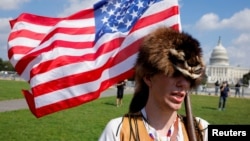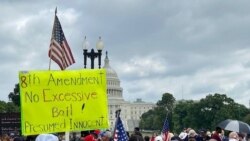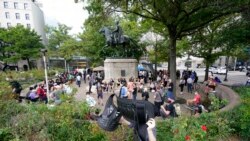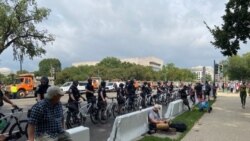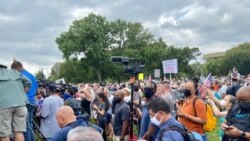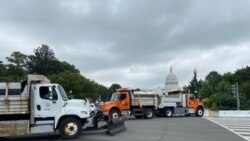Police officers and journalists appeared to outnumber protesters Saturday at a rally at the U.S. Capitol, the site of a deadly insurrection earlier this year.
Law enforcement officials in Washington were on high alert for the rally, bringing in hundreds of extra officers. The reinforced fence and concrete barriers were again erected around the Capitol. Metal barriers separated the area of the rally from streets circling the Capitol. Signs reading “No Gun Zone” were posted, reminding visitors of Washington’s local law forbidding openly carrying firearms.
About 100 D.C. National Guard members were stationed nearby.
The U.S. Capitol Police estimated there were 400 to 450 people inside the protest area, excluding law enforcement. A handful of arrests were made. One man was carrying a knife, another had a handgun, and two people were arrested on warrants from Texas, the Capitol Police said on Twitter.
Reuters reported shouting matches and some scuffles between protesters and counterprotesters.
Called “Justice for J6,” the protest was in support of suspects jailed after the January 6 attack in which backers of former President Donald Trump sought to prevent the certification of Joe Biden’s victory in the 2020 presidential election.
Capitol Police said before the rally that they were aware of internet chatter about potential violence and were taking precautions, should the chatter turn out to be credible.
“We would be foolish not to take seriously the intelligence that we have at our disposal,” USCP Chief Tom Manger said.
Manger was particularly concerned about the possibility of confrontations between protesters and counterprotesters who were at sites about a kilometer apart. He called it the “most likely scenario” for violence, adding that the counterprotesters were from three groups — two historically peaceful and one that has “had some clashes before.”
Congress was not in session and Biden was in Delaware this weekend.
Coordination web
Law enforcement precautions called for coordination between the police who patrol the Capitol, congressional buildings and their grounds and police for the District of Colombia.
Officials took pains Friday to reassure the public that they were better organized than in January and would not tolerate the violence that led to the breach of the Capitol. USCP management had been criticized for underestimating the potential for violence on January 6 and leaving officers unprepared for what they faced.
Yogananda Pittman, assistant chief for protective and intelligence operations for the USCP, said the department traditionally relied on outside sources for intelligence about potential threats but had expanded its reach and “dramatically changed the way that we process and share intelligence with our law enforcement partners at every level.”
No tolerance of hate
The head of the city’s Homeland Security and Emergency Management Agency spoke out ahead of the rally.
“The District of Columbia is 700,000 residents strong,” Christopher Rodriguez said, “and we do not tolerate hate, violence or the criminal actions of those who committed the insurrection on January 6th.”
On January 6, a group of about 800, mainly supporters of former President Donald Trump, overran the Capitol, forcing sitting members of the House and Senate to flee to safety. Five people died during or immediately after the attack, which was repulsed after hours of hand-to-hand combat. More than 600 people have been charged with crimes and, according to the District of Columbia Corrections Department, about 40 remain jailed.
Request for White House records
A House of Representatives select committee is investigating the attack. In late August, the committee requested White House records from the former Trump administration, the FBI and other federal entities.
The ex-president had not commented on Saturday's rally but did refer to those charged in the January attack, saying, “Our hearts and minds are with the people being persecuted so unfairly.”
Rally organizer Matt Braynard is a Trump supporter who formerly worked as an analyst for the Republican Party. Braynard and other rally organizers refer to those still behind bars as “political prisoners.”
When asked to respond, the USCP police chief said, “Everybody’s got the right to free speech. They can believe what they want to believe. I’m there to uphold the rule of law and make sure everybody’s safe.”




